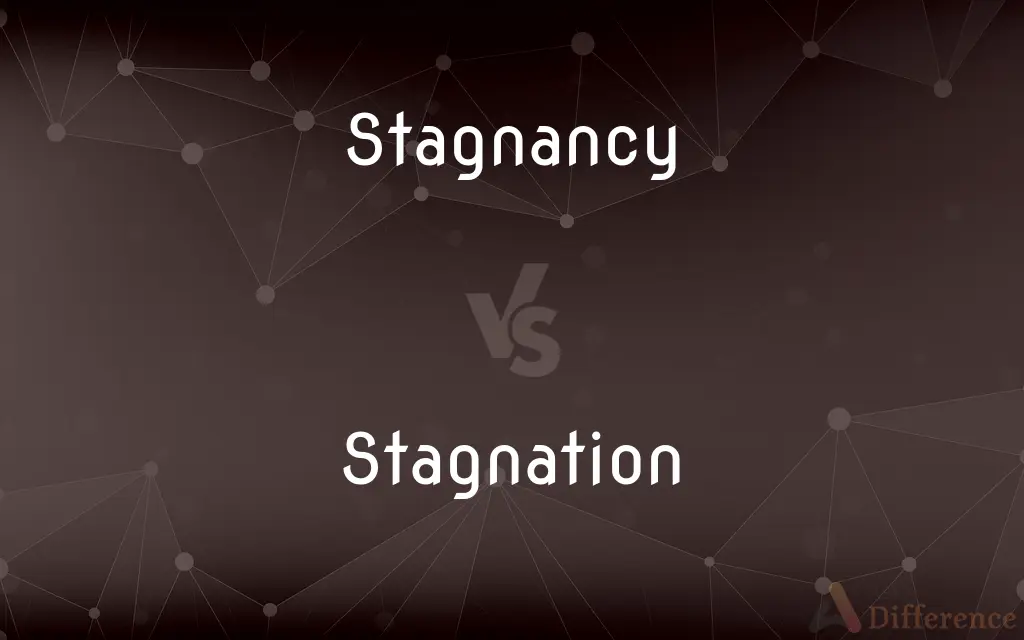Stagnancy vs. Stagnation — What's the Difference?
By Tayyaba Rehman & Maham Liaqat — Updated on March 26, 2024
Stagnancy is a state of not flowing or moving, often implying inactivity, while stagnation refers to a lack of development, growth, or advancement, typically in economic or water contexts.

Difference Between Stagnancy and Stagnation
Table of Contents
ADVERTISEMENT
Key Differences
Stagnancy captures a condition where there is an absence of movement or flow, often used metaphorically to describe situations or environments that are static or unchanging. It suggests a lack of progress or dynamism, potentially leading to negative outcomes due to inactivity. On the other hand, stagnation specifically denotes a halt in growth, progress, or flow, frequently applied to economic contexts, bodies of water, or any scenario where development is expected but has ceased.
While stagnancy often pertains to physical states or qualities, suggesting something is dormant or inert, stagnation is broader, encompassing not just physical standstill but also halts in processes or growth. For example, water showing no signs of flow exhibits stagnancy, whereas an economy that is not growing or advancing is experiencing stagnation.
The nuances between the two terms become clearer when considering their usage in various contexts. Stagnancy might describe the condition of water in a pond that has become foul due to a lack of movement, highlighting an undesirable state. Conversely, stagnation might be used to describe a period of economic downturn when industries or markets show no signs of growth or improvement, pointing to broader implications and the need for intervention.
Both terms share a commonality in their negative connotations, indicating situations or conditions where the lack of change is problematic. However, stagnation is more likely to be used in discussions about economic policies, health, or environmental issues, where the implications of halted progress or flow have significant consequences.
Despite these differences, stagnancy and stagnation both underscore the importance of movement, growth, and dynamism for health, prosperity, and well-being, whether in natural environments, economic systems, or personal development.
ADVERTISEMENT
Comparison Chart
Definition
The state of not flowing or moving; inactivity.
The condition of having stopped developing, growing, or advancing.
Common Usage
Often used to describe physical conditions, like water.
Broadly applies to economic conditions, processes, or growth.
Contexts
Environmental, personal growth, or physical states.
Economic, environmental, societal development.
Implications
Suggests an undesirable state due to lack of change or movement.
Indicates a critical halt in development or progress needing action.
Examples
Stagnant water in a pond, a stagnant career.
Economic stagnation, stagnation in innovation.
Compare with Definitions
Stagnancy
Associated with unproductive or idle states.
The stagnancy of the project was due to a lack of funding.
Stagnation
A halt in development or progress.
The country's economic stagnation has led to high unemployment rates.
Stagnancy
Condition of having no movement or flow.
The pond's stagnancy resulted in a buildup of algae.
Stagnation
Lack of advancement or growth.
The stagnation of technological innovation could hinder future progress.
Stagnancy
Reflecting a lack of change or innovation.
The stagnancy in the music industry is evident in the repetitive chart-toppers.
Stagnation
Can apply to natural phenomena or societal issues.
The stagnation in climate action efforts is alarming.
Stagnancy
Implies something is stuck or unmoving.
The stagnancy in negotiations led to increased tension.
Stagnation
Used to describe slow-moving or static economies.
Measures are being taken to combat the economic stagnation.
Stagnancy
Often used in environmental contexts.
The river's stagnancy has raised concerns about water quality.
Stagnation
Indicates a need for change or action.
Stagnation in policy reform has delayed necessary societal changes.
Stagnancy
Not flowing or moving, and often foul-smelling or stale
Stagnant ponds.
Stagnant air.
Stagnation
To be or become stagnant.
Stagnancy
Showing little or no activity or vitality; inactive or sluggish
A stagnant economy.
A stagnant mind.
Stagnation
Inactivity.
The general concern about industrial stagnation inspired an overhaul of the patent system.
Stagnancy
The property of being stagnant.
Stagnation
The state of being stagnant, without circulation.
Factors known to encourage the growth of harmful bacteria inside cooling systems include the stagnation of the water.
Stagnancy
State of being stagnant.
Stagnation
The cessation of action, or of brisk action; the state of being dull; as, the stagnation of business.
Stagnancy
Inactivity of liquids; being stagnant; standing still; without current or circulation
Stagnation
A state of inactivity (in business or art etc);
Economic growth of less than 1% per year is considered to be economic stagnation
Stagnancy
A state of inactivity (in business or art etc);
Economic growth of less than 1% per year is considered to be economic stagnation
Stagnation
Inactivity of liquids; being stagnant; standing still; without current or circulation
Common Curiosities
What are the effects of economic stagnation?
Economic stagnation can lead to unemployment, decreased consumer spending, and overall economic decline.
What does stagnancy imply?
Stagnancy implies a state of inactivity or lack of movement, often leading to negative consequences.
What causes stagnancy in water bodies?
Stagnancy in water bodies can be caused by a lack of inflow or outflow, leading to undesirable conditions like algae growth.
What strategies combat economic stagnation?
Strategies may include stimulating investment, encouraging innovation, and implementing policy reforms to spur growth.
Can stagnancy and stagnation be used interchangeably?
While they share similarities, they are often used in different contexts, with stagnation having a broader application, including economic and societal growth.
How is stagnation defined?
Stagnation refers to a halt in growth, development, or advancement, especially in economic contexts.
Can an economy recover from stagnation?
Yes, economies can recover from stagnation through effective policies, innovation, and external investments.
How can individuals combat stagnancy in their careers?
Seeking new skills, embracing challenges, and exploring different opportunities can help individuals overcome career stagnancy.
How can stagnancy be addressed in personal growth?
Overcoming stagnancy in personal growth often involves setting new goals, seeking challenges, and embracing change.
How do stagnancy and stagnation affect mental health?
Both can lead to feelings of frustration and demotivation, highlighting the importance of seeking progress and change.
What long-term impacts can stagnation have on a society?
Long-term stagnation can lead to economic decline, reduced quality of life, and increased social unrest, emphasizing the need for proactive measures.
Is stagnancy always negative?
While typically viewed negatively, periods of stagnancy can offer opportunities for reflection and strategic planning.
Can technological sectors experience stagnation?
Yes, without innovation or new developments, technological sectors can face stagnation, hindering advancement.
What distinguishes stagnancy from stagnation in environmental contexts?
Stagnancy directly refers to the lack of physical movement, such as in water, while stagnation can refer to broader environmental issues, including growth and development.
What role does government policy play in addressing stagnation?
Government policy is crucial in creating conditions that foster growth and prevent stagnation through incentives, reforms, and investments.
Share Your Discovery

Previous Comparison
Process vs. Operation
Next Comparison
Conjecture vs. SpeculateAuthor Spotlight
Written by
Tayyaba RehmanTayyaba Rehman is a distinguished writer, currently serving as a primary contributor to askdifference.com. As a researcher in semantics and etymology, Tayyaba's passion for the complexity of languages and their distinctions has found a perfect home on the platform. Tayyaba delves into the intricacies of language, distinguishing between commonly confused words and phrases, thereby providing clarity for readers worldwide.
Co-written by
Maham Liaqat













































